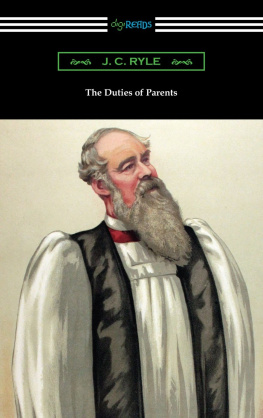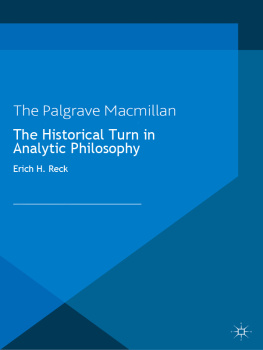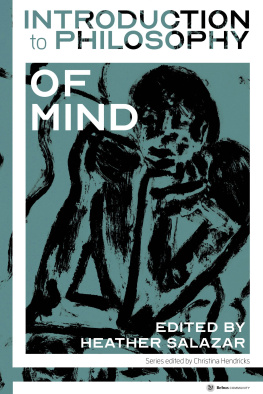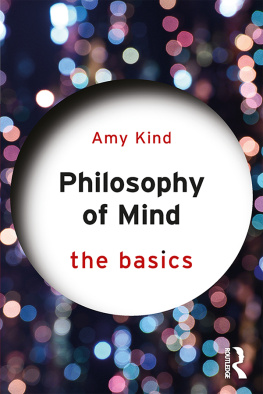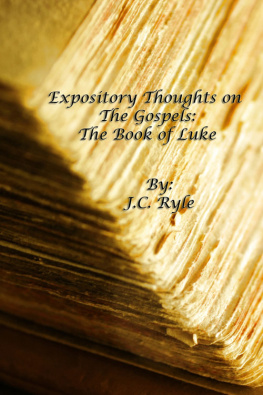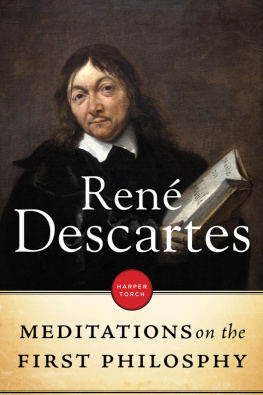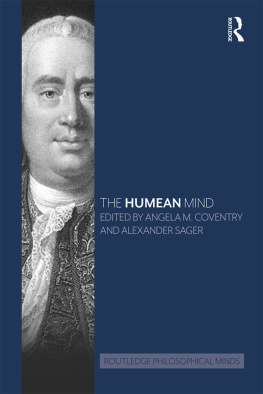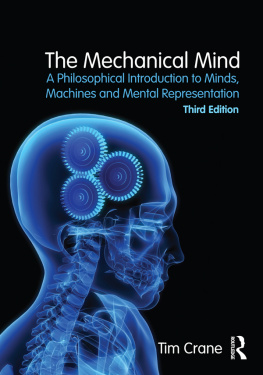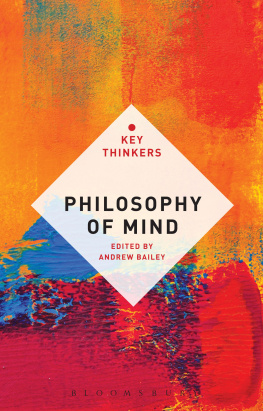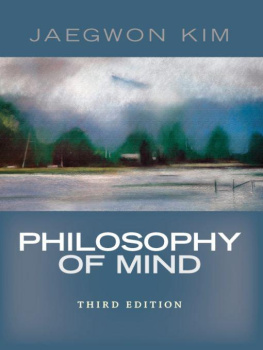The Concept of Mind
First published in 1949, Gilbert Ryles The Concept of Mind is one of the classics of twentieth-century philosophy. Described by Ryle as a sustained piece of analytical hatchet-work on Cartesian dualism, The Concept of Mind is a radical and controversial attempt to jettison once and for all what Ryle called the ghost in the machine: Descartes argument that mind and body are two separate entities.
As well as rejecting dualism about the mind, Ryle goes much further, arguing that more recent materialist or functionalist theories of mind do not solve the Cartesian puzzle either and even accept some of its fundamental, mistaken, propositions. It is because of these mistaken propositions that associated problems, such as mental causation and other minds, arise in the first place.
Ryle builds his case via an erudite and beautifully written account of the will, emotion, self-knowledge, sensation and observation, imagination and the intellect. Some of the problems he tackles, such as the distinction between knowing how and knowing that, challenged some of the bedrock assumptions of philosophy and continue to exert important influence on contemporary philosophy.
A classic work of philosophy, The Concept of Mind is essential reading for anyone interested in the nature of the mind and human behaviour. This sixtieth anniversary edition includes a substantial commentary by Julia Tanney. Together with the reissue of both volumes of Ryles Collected Papers, it provides essential reading for new readers interested not only in the history of analytic philosophy but in its power to challenge major currents in philosophy of mind and language today.
Gilbert Ryle (19001976) was a lecturer in philosophy at Christ Church College Oxford and in 1945 was elected to the Waynflete Chair of Metaphysical Philosophy; a position he held until his retirement in 1968. He was Editor of the journal Mind for almost twenty-five years.
Julia Tanney is Senior Lecturer of Philosophy at the University of Kent, and has held visiting positions at the Universities of Picardie and Paris-Sorbonne.
This new edition of Ryles classic work, with a substantial critical study by Julia Tanney, will make possible a re-assessment of Ryle and of the revolutionary potential ofThe Concept of Mind. Tanneys essay challenges every aspect of the familiar conception of Ryles thought, and shows that his ideas, properly understood, reveal fundamental problems within contemporary philosophy of mind and cognitive science. Ryles approach to philosophy of mind is, she claims, not even one which we have room for in our usual understanding of what the possible positions are in philosophy of mind. Tanneys treatment of Ryle is complex and subtle, and opens up important new ways of thinking in philosophy of mind and philosophy of language.
Cora Diamond, University of Virginia, USA
THE CONCEPT OF MIND
Gilbert Ryle
First published 1949 by Hutchinson
This edition published 2009 by Routledge
2 Park Square, Milton Park, Abingdon, Oxon OX14 4RN
Simultaneously published in the USA and Canada
by Routledge
270 Madison Ave, New York, NY 10016
Routledge is an imprint of the Taylor & Francis Group, an informa business
This edition published in the Taylor & Francis e-Library, 2009.
To purchase your own copy of this or any of Taylor & Francis or Routledges collection of thousands of eBooks please go to www.eBookstore.tandf.co.uk.
The Estate of Gilbert Ryle: Hertford College, University of Oxford
2009 Julia Tanney for Critical Commentary
All rights reserved. No part of this book may be reprinted or reproduced or utilized in any form or by any electronic, mechanical, or other means, now known or hereafter invented, including photocopying and recording, or in any information storage or retrieval system, without permission in writing from the publishers.
British Library Cataloguing in Publication Data
A catalogue record for this book is available from the British Library
Library of Congress Cataloging in Publication Data
Ryle, Gilbert, 19001976
The concept of mind / by Gilbert Ryle.
p. cm.
Includes bibliographical references and index.
1. Mind and body. I. Title.
BF161.R9 2009
128.2dc22
2008054171
ISBN 0-203-87585-0 Master e-book ISBN
ISBN10: 0-415-48547-9 (hbk)
ISBN10: 0-203-87585-0 (ebk)
ISBN13: 978-0-415-48547-0 (hbk)
ISBN13: 978-0-203-87585-8 (ebk)
RETHINKING RYLE
A Critical Discussion of The Concept of Mind
Julia Tanney
I INTRODUCTION
Gilbert Ryles The Concept of Mind was published in 1949 both to wide acclaim and to general bemusement. It was anticipated by its critics as a book that would, if not set the agenda for philosophy of mind, then at least preoccupy it for the then foreseeable future. Now, more than sixty years after its initial publication, we are in a better position to appreciate its legacy. Although Ryle published on a wide range of topics in philosophy (notably in the history of philosophyespecially Platoand in philosophy of language), including a series of lectures centred on philosophical dilemmas, The Concept of Mind remains his best known and most important work. Through this work, Ryle is thought to have accomplished two major tasks. First, he was seen to have put the final nail in the coffin of Cartesian dualism. Second, as he himself anticipated, he is thought to have argued on behalf of, and suggested as dualisms replacement, the doctrine known as philosophical (and sometimes analytical) behaviourism. Sometimes known as an ordinary language, sometimes as an analytic, philosopher, Ryleeven when mentioned in the same breath as Wittgenstein and his followersis considered to be on a different, somewhat idiosyncratic (and difficult to characterise), philosophical track.
To credit Ryle with demolishing substance dualism and paving the way for behaviourism is to underestimate his achievement. Hardly anyone working in philosophy of mind today takes seriously the view Ryle describes in his book as the official doctrinethe view he ridicules as the myth of the ghost in the machine. It is widely agreed that the chaff of philosophical behaviourism has long been discarded while the wheat has been appropriated by the philosophical doctrine of functionalism. Functionalism in one of its many forms is widely accepted in the philosophy of mind today (and it gains its appeal by appearing as the best philosophical articulation of underlying assumptions in the cognitive sciences). It is a view that is thought to have saved the reality of the mental from the eliminativist or fictionalist tendencies of behaviourism while acknowledging the insight (often attributed to Ryle) that the mental is importantly related to behavioural output or response (as well as to stimulus or input). According to a reasonably charitable assessment, the best of Ryles lessons has long been assimilated while the problematic has been discarded. If there are considerations still brewing from the 1930s and 1940s that would threaten the orthodoxy in contemporary philosophy of mind, these lie somewhere in the work of Wittgenstein and his followersnot in Ryle.
I shall argue that the view just outlined, although widespread, represents a fundamental misapprehension of Ryles work. First, the official doctrine is dead in only one of its ontological aspects: substance dualism may well have been repudiated but property dualism still claims a number of contemporary defenders. Indeed, both non-reductive and reductive physicalists are entangled in a metaphysical overgrowth whose roots are firmly established in the soil of the official doctrine. The problem of finding a place for the mental in the physical world, of accommodating the causal power of the mental, and of accounting for the phenomenal aspects of consciousness are all live problems in the philosophy of mind today because they share some combination of the doctrines ontological, epistemological, and semantic assumptions. So the time has come to pay new attention to Ryles little understood dissolution of the mindbody problem.


